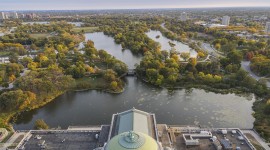TCLF's Section 106 Letter Concerning the Obama Presidential Center
EDITOR’S NOTE: The Section 106 review of the Obama Presidential Center has resulted in a draft Memorandum of Assessment (MOA) that details efforts to avoid, minimize and/or mitigate the documented adverse effects on Jackson Park. The Cultural Landscape Foundation (TCLF), an "official consulting party" to the Section 106 process, sent a letter to the Federal Highway Administration, which is managing the Section 106 process, concerning the draft MOA. As an official consulting party, TCLF was invited to be a signatory to the MOA. Here is TCLF's position about the proposed MOA.
Mr. Matt Fuller
Federal Highway Administration
3250 Executive Park Drive
Springfield, IL 62703
Re: Draft Memorandum of Agreement for the Section 106 review of the Obama Presidential Center
Dear Mr. Fuller,
On behalf of The Cultural Landscape Foundation (TCLF), we have welcomed the opportunity and responsibility of being an official consulting party to the Section 106 compliance review for the proposed Obama Presidential Center (OPC) in Chicago’s historic Jackson Park.
Our involvement with the potential site of the OPC dates back more than five years before Jackson Park was selected for what was then intended to be the Obama Presidential Library. We have never opposed either a presidential library or the OPC on Chicago’s South Side; however, from day one we have been opposed to the confiscation of historic parkland – thrice designed by Frederick Law Olmsted, Sr., listed in the National Register of Historic Places and held in public trust – for such a facility.
It was our sincere belief, based on multiple decades of involvement as an official consulting party in many Section 106 compliance reviews, that there would be a good faith effort on the part of the Federal Highway Administration (FHWA) to appropriately manage the Section 106 process. It was also our sincere belief that there would be a good faith effort to develop one or more alternatives to avoid and/or minimize any adverse effects on Jackson Park.
Unfortunately, the Section 106 meetings, which aim to identify adverse effects and the methods to avoid, minimize and/or mitigate the adverse effects, were rather unwieldy gatherings that repeatedly strayed from the core mission of addressing the adverse effects while securing “public views and concerns about historic preservation issues when making final project decisions.” Managers of the Section 106 process repeatedly indulged participants who rendered commentary that was not germane. There are many other venues and public processes through which OPC advocates could voice and have voiced their opinions. The Section 106 process is a rare instance where the resource, in this case Jackson Park, is afforded a statutory voice.
However, what remains deeply troubling is the abdication to consider any methods to avoid and/or minimize the adverse effects that have repeatedly been identified since the very first consulting party meeting on December 1, 2017. Section 106 requires that alternatives be developed to address adverse effects – this did not happen, which is a contravention of established law, policy, procedure and precedent. Instead FHWA declared that it and the federal regulatory process were helpless, impotent and powerless to address the “city action” that would enable construction of the OPC, despite established precedent to the contrary. The Section 106 managers in this case were complicit in the undermining of a process meant to safeguard the nation’s unique and historic built legacy.
What the FHWA has done not only helps to solidify a dangerous precedent for the future confiscation of parkland held in public trust, it also subverts the strength of the federal regulatory process.
Consequently, the draft Memorandum of Agreement (MOA) that has been developed, one that memorializes a flawed process and outcome, is not something that TCLF can or will support.
Sincerely,

Charles A. Birnbaum, FASLA, FAAR








